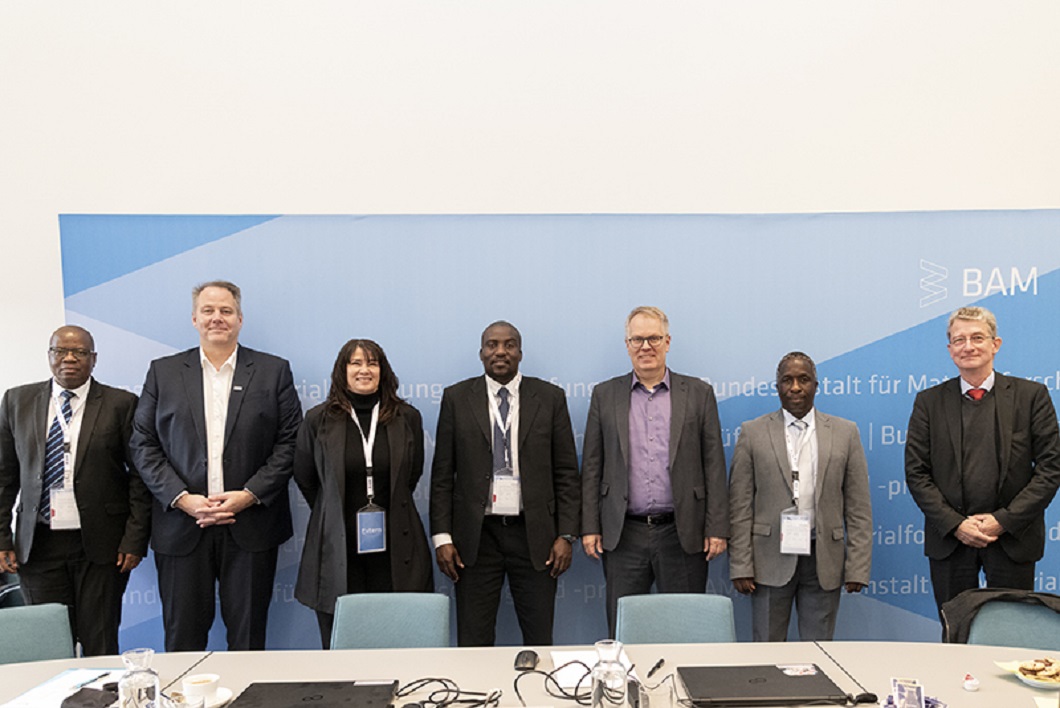
L.t.r.: Dr. Marius Kudumo (UNAM), Dr. Kai Holtappels, Prof. Dr. Anica Peters (UNAM), Prof. Dr. Kenneth Matengu (UNAM), Prof. Dr. Ulrich Panne, Dr. Zivayi Chiguvare (NGHR) und Prof. Dr. Thomas Böllinghaus.
Source: BAM
The Bundesanstalt für Materialforschung und -prüfung (BAM) and the University of Namibia as well as the Namibia Green Hydrogen Research Institute are intensifying their cooperation as governmental institutions in the field of green hydrogen technologies. BAM will establish doctoral positions for this purpose and become involved in the training of young academics in Namibia. The common goal is to build up capacities for the safe production of green hydrogen in the country as quickly as possible.
In order to secure its long-term demand for green hydrogen, Germany is dependent on imports for about 80 per cent. Namibia, on the other hand, is considered one of the countries with the best conditions worldwide for the cheap production of the CO2-neutral energy carrier. Within the African continent, it maintains a leading position in this field. In August last year, the German government therefore decided to establish a hydrogen partnership in a joint declaration of intent with Namibia.
BAM is a leader in Germany in research on the safety of hydrogen technology and advises the Federal Government with its hydrogen Competence Centre H2Safety@BAM. Against the background of the planned hydrogen partnership, BAM is already cooperating closely with the University of Namibia and the Namibia Green Hydrogen Research Institute. The cooperation focuses in particular on safety aspects in order to create trust and acceptance in green hydrogen technologies in Namibia.
During the visit of the delegation from the University of Namibia, which included Vice Chancellor Prof. Dr. Kenneth Matengu, Pro-Vice Chancellor Prof. Dr. Anicia Peters, Dr. Marius Kudumo, Director of Corporate Engagement and International Relations, and Dr. Zivayi Chiguvare, Acting Director of the Namibia Green Hydrogen Research Institute, the next steps of the cooperation were now concretized.
From 2023, BAM will provide five doctoral positions for young scientists from Namibia and offer Master of Science students in the field of renewable energies and green hydrogen technologies research stays in Berlin as well as short courses for rapid qualification. Scientists from the H2Safety@BAM Competence Centre will give lectures on site in Namibia and online. BAM also supports the University of Namibia and the Namibia Green Hydrogen Research Institute on research proposals. A special focus of the cooperation will be laid on the development of laboratory capacities as well as a quality and standardization infrastructure for green hydrogen technologies in Namibia in order to support the country in further industrialization.
Prof. Dr. Kenneth Matengu: “In the context of Namibia´s property plans for the industrialization and wealth creation, and especially with regard to creating adequate scientific and research and development capacity on regard to green hydrogen technologies, quality assurance infrastructure and management, the cooperation between University of Namibia and BAM will support the growth of this sector. In our strategic partnership it is envisaged that the Namibia Green Hydrogen Research Institute and University of Namibia will work to establish a similar institution like BAM in relation to a Competence Centre on H2Safety. For this to be realized, specific lab capacity has to be built in parallel to the education of scientific and technical staff. Therefore, we are very much looking forward to the cooperation with BAM to provide us their experience and technologies. We are proud to be associated with BAM.”
“Both sides will benefit from a deepened cooperation", says Prof. Dr Ulrich Panne, President of BAM. "The current development shows us how urgent the transformation of the energy sector is. Thereby it is particularly important to us that the entire value chains for green hydrogen remain in Namibia in order to promote the economic development of the country.”


